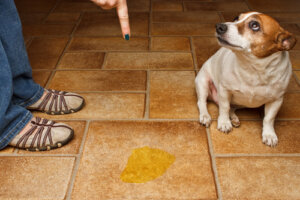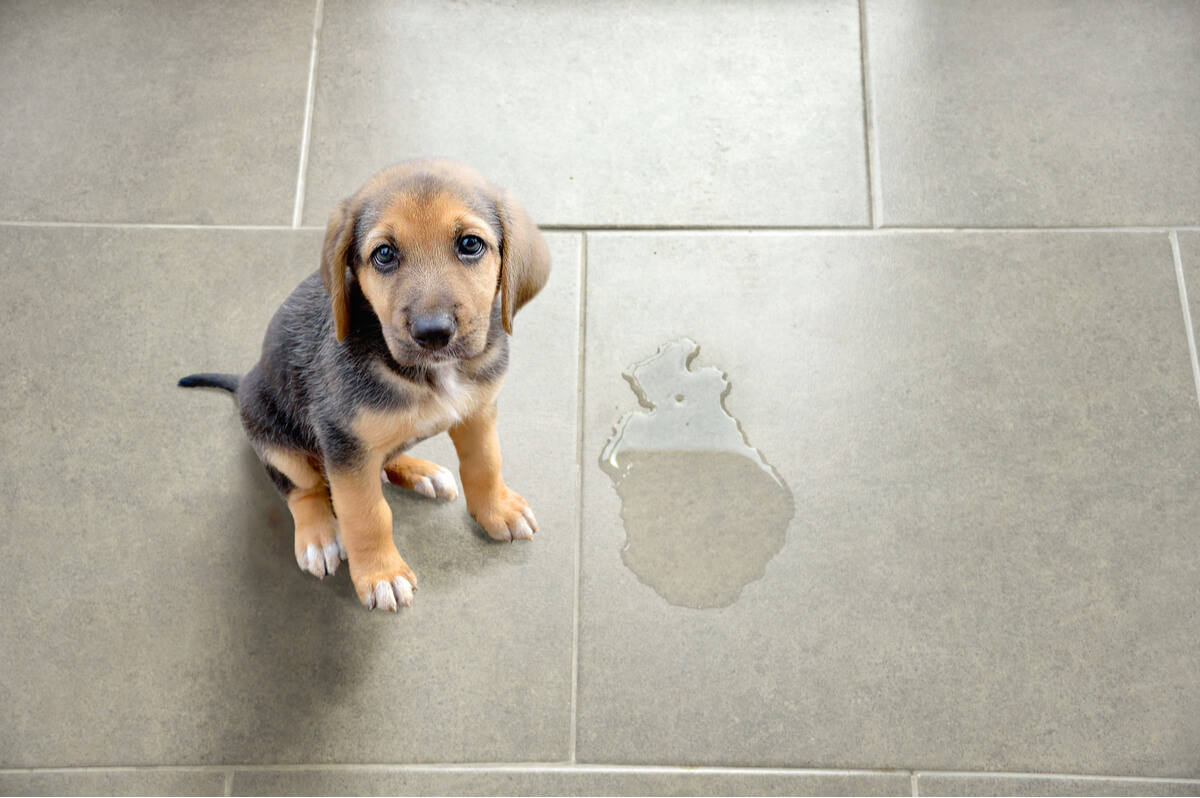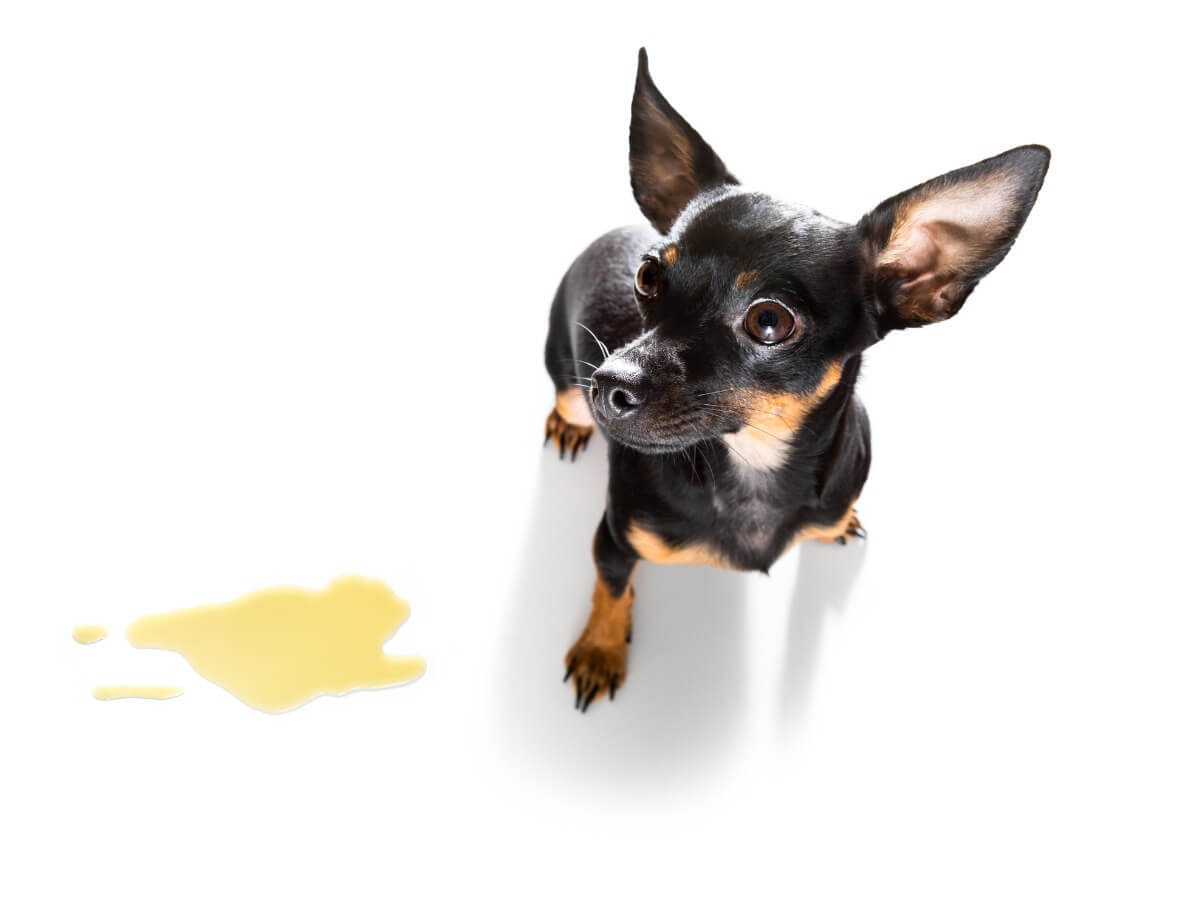Tips to Eliminate Dog Urine Odor


Written and verified by the biologist Cesar Paul Gonzalez Gonzalez
One of the most important parts of raising a dog is teaching them where to relieve themself. However, this usually takes time and it’s normal for several accidents to occur before this is achieved. This is a conflict for some owners, because in certain cases it’s quite difficult to eliminate dog urine odor.
You need to take into account that the pet won’t always learn to relieve itself in the right place as quickly as we would want. Even when they’ve already learned to do it, they still might have accidents at home. If you want to find out some tips to efficiently eliminate this odor, keep reading this space.
Why is it important to eliminate dog urine odor?
Apart from being a necessary hygienic measure for the family’s health, eliminating dog urine odor is crucial to reinforce the dog’s learning. Keep in mind that these animals use urine as a territorial marking system. Therefore, if you don’t clean the area well, they’ll return to the same place to relieve themself to avoid losing their “smell”.
The dog’s sense of smell is trained to ignore other smells and focus only on the one that interests them. Even if it isn’t perceptible to humans, the slightest trace of urine could cause them to relieve themself inside the home. This means that to help them in their training, you should clean the areas where an accident of this type has occurred very well.

Why should they not be punished to avoid accidents?
It is normal to think that strong scolding or punishment could prevent the pet from urinating inside the house. However, this is counterproductive and could cause serious anxiety problems. In addition to this, if these are your first days with your dog, it’s also likely to cause them to lose confidence and make living together more difficult.
Positive reinforcement is always the best way to avoid bad habits in the dog. Not only because you avoid mistreating the animal, but also because it benefits the relationship between owners and their pets, which is a great advantage in the long run. On the contrary, punishments confuse the dog more and promote behavioral disorders.
How can I eliminate dog urine odor?
Products such as detergent, bleach, and various scented cleaners can temporarily hide the smell of urine. However, this only fools the human sense, as most dogs can still detect the scent without a problem.
Dog urine contains several acidic components that make it quite persistent on surfaces. Therefore, if left to act on the floor for a long time, the odor penetrates sufficiently and becomes a difficult problem to eradicate.
It’s important to note that not all household products are capable of eliminating dog urine odor. Examples include those containing ammonia (such as bleach), which is also a component of urine. Consequently, dogs detect a similar odor that prompts them to relieve themselves in that place.
Effective products to remove dog urine odor
Certain common household products can help remove dog urine odor. While you may need to apply them several times to the area, they ensure that no trace of this unpleasant scent will be left behind. Listed below are some of the most common and easy to use ones:
- Hydrogen peroxide: Dilute this substance in water in equal parts and apply directly to the desired area. To improve its effect you can add soap or baking soda to this mixture.
- Vinegar: Acetic acid (vinegar) is a substance that eliminates the deepest traces of urine and neutralizes odors very well. Its use only requires diluting it in water in equal parts, applying the mixture, and letting it stand for at least 30 minutes. Clean the excess from the area and repeat the process if necessary.
- Sodium bicarbonate: This product is an alkaline abrasive that has a similar effect to acetic acid. To use it, sprinkle the baking soda on the surface and let it act for about 12 hours. After that, vacuum it or clean it with a little water and repeat if necessary.
- Lemon: Citrus liquid is actually an acid that can be used to deep clean your home. In fact, all you need to do is apply lemon juice directly and add a little baking soda to it. This will cause an effervescent reaction and you should leave it on for at least 30 minutes. Afterwards, clean the remains with water and repeat the process if necessary.
- Sodium borate (borax): This product is a chemical abrasive that makes it easy to remove urine residue. However, it’s so irritating that it can cause skin, throat, or lung problems, so avoid using it if it isn’t strictly necessary.
- Commercial cleaners (enzymes): There are a variety of enzymatic pet cleaners on the market. These products use biological agents that process the entire contents of the urine so that odors are easily removed. The only problem is that they’re usually quite expensive, although it’s worth it.

Recommendations when performing the cleaning
Most of the above products are harmless to pets, but this doesn’t mean that the dog should be near when you’re doing the cleaning. Keep in mind that their sense of smell is much more sensitive than ours, so using vinegar, baking soda, hydrogen peroxide or borax may cause them slight discomfort.
For this reason, it is best to keep the vents open during the cleaning and avoid your dog being nearby. This way you will save him from any problem or irritation that could become complicated in the future. In addition, it is good to always prioritize the hygiene of your home, but do not forget to take care of your health. So remember to use gloves and masks while grooming.
One of the most important parts of raising a dog is teaching them where to relieve themself. However, this usually takes time and it’s normal for several accidents to occur before this is achieved. This is a conflict for some owners, because in certain cases it’s quite difficult to eliminate dog urine odor.
You need to take into account that the pet won’t always learn to relieve itself in the right place as quickly as we would want. Even when they’ve already learned to do it, they still might have accidents at home. If you want to find out some tips to efficiently eliminate this odor, keep reading this space.
Why is it important to eliminate dog urine odor?
Apart from being a necessary hygienic measure for the family’s health, eliminating dog urine odor is crucial to reinforce the dog’s learning. Keep in mind that these animals use urine as a territorial marking system. Therefore, if you don’t clean the area well, they’ll return to the same place to relieve themself to avoid losing their “smell”.
The dog’s sense of smell is trained to ignore other smells and focus only on the one that interests them. Even if it isn’t perceptible to humans, the slightest trace of urine could cause them to relieve themself inside the home. This means that to help them in their training, you should clean the areas where an accident of this type has occurred very well.

Why should they not be punished to avoid accidents?
It is normal to think that strong scolding or punishment could prevent the pet from urinating inside the house. However, this is counterproductive and could cause serious anxiety problems. In addition to this, if these are your first days with your dog, it’s also likely to cause them to lose confidence and make living together more difficult.
Positive reinforcement is always the best way to avoid bad habits in the dog. Not only because you avoid mistreating the animal, but also because it benefits the relationship between owners and their pets, which is a great advantage in the long run. On the contrary, punishments confuse the dog more and promote behavioral disorders.
How can I eliminate dog urine odor?
Products such as detergent, bleach, and various scented cleaners can temporarily hide the smell of urine. However, this only fools the human sense, as most dogs can still detect the scent without a problem.
Dog urine contains several acidic components that make it quite persistent on surfaces. Therefore, if left to act on the floor for a long time, the odor penetrates sufficiently and becomes a difficult problem to eradicate.
It’s important to note that not all household products are capable of eliminating dog urine odor. Examples include those containing ammonia (such as bleach), which is also a component of urine. Consequently, dogs detect a similar odor that prompts them to relieve themselves in that place.
Effective products to remove dog urine odor
Certain common household products can help remove dog urine odor. While you may need to apply them several times to the area, they ensure that no trace of this unpleasant scent will be left behind. Listed below are some of the most common and easy to use ones:
- Hydrogen peroxide: Dilute this substance in water in equal parts and apply directly to the desired area. To improve its effect you can add soap or baking soda to this mixture.
- Vinegar: Acetic acid (vinegar) is a substance that eliminates the deepest traces of urine and neutralizes odors very well. Its use only requires diluting it in water in equal parts, applying the mixture, and letting it stand for at least 30 minutes. Clean the excess from the area and repeat the process if necessary.
- Sodium bicarbonate: This product is an alkaline abrasive that has a similar effect to acetic acid. To use it, sprinkle the baking soda on the surface and let it act for about 12 hours. After that, vacuum it or clean it with a little water and repeat if necessary.
- Lemon: Citrus liquid is actually an acid that can be used to deep clean your home. In fact, all you need to do is apply lemon juice directly and add a little baking soda to it. This will cause an effervescent reaction and you should leave it on for at least 30 minutes. Afterwards, clean the remains with water and repeat the process if necessary.
- Sodium borate (borax): This product is a chemical abrasive that makes it easy to remove urine residue. However, it’s so irritating that it can cause skin, throat, or lung problems, so avoid using it if it isn’t strictly necessary.
- Commercial cleaners (enzymes): There are a variety of enzymatic pet cleaners on the market. These products use biological agents that process the entire contents of the urine so that odors are easily removed. The only problem is that they’re usually quite expensive, although it’s worth it.

Recommendations when performing the cleaning
Most of the above products are harmless to pets, but this doesn’t mean that the dog should be near when you’re doing the cleaning. Keep in mind that their sense of smell is much more sensitive than ours, so using vinegar, baking soda, hydrogen peroxide or borax may cause them slight discomfort.
For this reason, it is best to keep the vents open during the cleaning and avoid your dog being nearby. This way you will save him from any problem or irritation that could become complicated in the future. In addition, it is good to always prioritize the hygiene of your home, but do not forget to take care of your health. So remember to use gloves and masks while grooming.
All cited sources were thoroughly reviewed by our team to ensure their quality, reliability, currency, and validity. The bibliography of this article was considered reliable and of academic or scientific accuracy.
- Kokocińska-Kusiak, A., Woszczyło, M., Zybala, M., Maciocha, J., Barłowska, K., & Dzięcioł, M. (2021). Canine olfaction: physiology, behavior, and possibilities for practical applications. Animals, 11(8), 2463.
- Estévez, P., & Ramil, I. (2005). Manual básico para la educación del cachorro. Recuperado el 25 de febrero de 2022, disponible en: https://vetpoblenou.com/blog/wp-content/uploads/2013/10/Eduacion-del-Cachorro.pdf
- Garzón, P. H. (2020). Manual de etología canina. Grupo Asís Biomedia SL.
- Organización Colegial Veterinaria Española. (2020). El Colegio de Veterinarios de Zaragoza colabora en la campaña “El pipí me destruye” para eliminar de las calles la orina de los perros. Recuperado el 25 de febrero de 2022, disponible en: https://colvet.es/node/9589
This text is provided for informational purposes only and does not replace consultation with a professional. If in doubt, consult your specialist.








